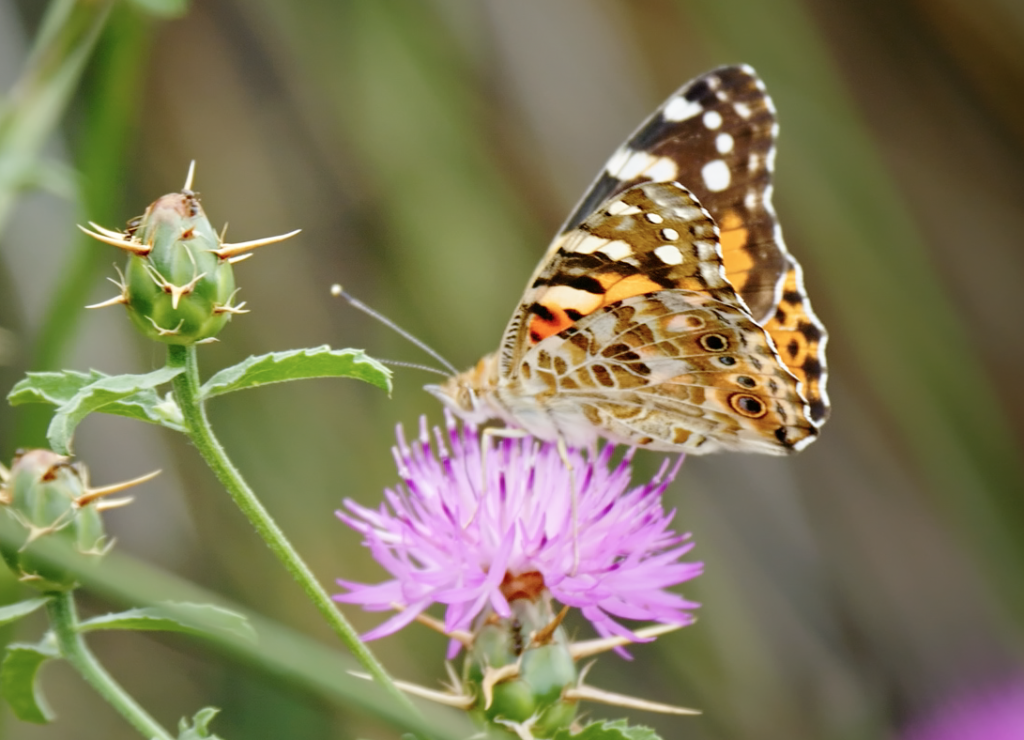“Butterflies? What do butterflies have to do with hunting?” Questioned the attractive lady, seated three rows from the front, when I answered her question as to why I hunt and had stated I did so because I loved butterflies! “That’s ridiculous! Butterflies don’t have anything to do with hunting!” She hesitated then questioned, “Are you telling me you shoot butterflies?”
During my talk I had noticed her “making faces” when I mentioned shooting animals. I suspected she was there not because she loved the outdoors, or hunting or fishing….
I smiled and wagged my head in a negative manner, “No Ma’am… But because of hunting we have butterflies, particularly compared to those areas where we do not hunt! And, I happen to really like watching butterflies in fields of wild flowers, as well as bees and other pollinators. If I see a lot of butterflies and bees, I know our wildlife management program, involving hunting, is doing its job of providing food and cover for all wildlife species including butterflies, bees, bugs and beetles, as well as song and game birds, and, non-game and game animals!”
“How can killing animals help create more butterflies?” asked she with a look of disdain.
Again I smiled, at the same time thinking, “Thank you, I thought you would never ask that question.”
“As a wildlife biologist I have had the opportunity to work with and in many different types of habitat and terrain across the world. All too often by the time I was called in to help, the property was in horrible shape. By that I mean most of the native vegetation was gone, eaten into the ground by too many animals. Without ground cover when it rained the soil eroded, taking with it seeds that had long been dropped to the ground where they waited to germinate. Over-grazing and browsing destroyed the plants which had lived there. With nothing to eat the animals there starved to death, or if they had the capabilities, moved to other areas where they created the same problems of no food or cover, followed by soil erosion when it rained. All this essentially because there was no hunting of the animals that lived on the property to properly conserve or manage the wildlife habitat, and, the animals to keep them from eating themselves out of house and home.”
“Without plants to hold the soil when it rains, and to produce vegetation; forage, seeds and fruits for insects, birds, small animals, large animals, wildlife cannot exist in those areas. One of the reasons for hunting is to sustain and keep wild populations from growing so large they destroy the habitat where they live. In many ways wildlife and wildlife conservation are not unlike a many-pieces puzzle, where all pieces are essentially the same size, but shaped differently. Increasing one or two pieces of the puzzle affects all the other pieces. If those pieces are increased they take space away from all the other pieces of the puzzle. The normal-sized pieces must adjust by decreasing in size. By continuing to increase the size of those one or two larger pieces, soon there is no more room for the smaller pieces. Eventually the smaller pieces will be deceased out of existence. They will be gone. At that point the two larger pieces totally control the entire puzzle and the many smaller pieces (butterflies, included) will be gone. Once that happens even the larger pieces will soon disappear. It is no longer a puzzle simply one mass that is no longer of interest…or filled with life.”
“The role of sustained hunting is to try to keep all the pieces of the puzzle essentially the same size, uniquely shaped they may be, viable and all integral to each other, so there is room for all the pieces, which help each other continuing to exist!”
“Butterflies, bees as well as song birds are all pieces of that giant puzzle. If they are present, I know the overall habitat is in good shape. Hunting makes certain all the pieces of the puzzle are there in proper proportions where all things benefit. So we come back to butterflies. Beyond as mentioned loving to watch butterflies, I know when I see them, the habit and the animals that live in that habitat are in harmony, again thanks to hunting!”
“If you truly love wildlife, all wildlife, thank a hunter, not only for keeping habitat and animals at a level where all benefit, but also because of the dollars hunters contribute through the Pittman Robertson Act of 1937 which provides money from the excise tax on the sale of guns, ammo and hunting equipment to State’s wildlife departments, and, through the sale of hunting licenses. Those hunter-generated dollars are then invested in non-game and game animals/wildlife and habitat so all will exist long into the future! Remember, if you truly love wildlife thank the hunters. Without them there would be few if any butterflies!”
— Larry Weishuhn

